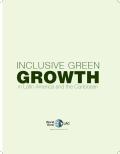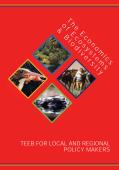This policy brief reviews the challenges of African urbanization as well as opportunities for sustainable development in the region. It notes that making urban areas green, inclusive, and resilient is part of the agenda for cities to be successful in the short and medium term. To acheive this, the policy brief notes that there must be: i) a clear vision; ii) coordination between city and national policies; iii) planning and integration of policies; and iv) learning from others. The brief concludes that part of the challenge of the coming decade is how to manage urbanization well by capturing long-term benefits without incurring unnecessary long-term costs. Pursuing a sensible green growth strategy is part of the solution.

This paper addresses the issues of urbanisation and green growth in Africa from the perspective of what it would take for African cities and countries to accommodate the upcoming urban explosion without the usual negative impact on the physical environment, and using it as an opportunity for innovative and green growth. The paper is organised in four parts. Part I reviews the performance of the African region, economic growth, urban expansion and the characteristics of the urbanisation process. Part II suggests a framework to discuss green growth at city level. It focuses on sectors normally under city responsibility (land, buildings, waste, urban transport) and reviews the use of public policies, including regulation, pricing, tax and investment criteria. Part III discusses combinations of policies for African cities at different stages of urbanisation and urban growth. Part IV summarises the key points for a forward-looking policy agenda. The reports draws on literature produced on Green Economy by UNEP, the World Bank, OECD, African Development Bank and provides relevant examples from Africa and cities in the world.

This document is intended to offer inspiration and practicable suggestions for the improvement and maintenance of the welfare of the environment and its inhabitants. TEEB in Local and Regional Policy and Management shows how by taking nature’s benefits into account, decision makers can promote local development to ensure human well-being and economic growth and stability, while also maintaining environmental sustainability.
This volume of the TEEB series of studies explores the potential for local development provided by an approach based on nature. It offers examples of successful implementation of this approach from across the world, highlighting the importance of local decision making in management and planning. The study provide tools and practical guidance for reform, and examines what local governments can do with respect to natural resource use and management, maintaining and supporting biodiversity, local and regional urban and spatial design, as well as market-based approaches, such as Payment for Ecosystem Services (PES).
Ho Chi Minh City faces significant and growing flood risk. Recent risk reduction efforts may be insufficient as climate and socio-economic conditions diverge from projections made when those efforts were initially planned. This study demonstrates how robust decision making can help Ho Chi Minh City develop integrated flood risk management strategies in the face of such deep uncertainty. Robust decision making is an iterative, quantitative, decision support methodology designed to help policy makers identify strategies that are robust, that is, satisfying decision makers’ objectives in many plausible futures, rather than being optimal in any single estimate of the future. This project used robust decision making to analyse flood risk management in Ho Chi Minh City’s Nhieu Loc-Thi Nghe canal catchment area. It found that the soon-to-be-completed infrastructure may reduce risk in best estimates of future conditions, but it may not keep risk low in many other plausible futures. Thus, the infrastructure may not be sufficiently robust.
